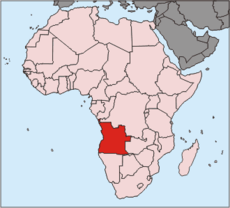United Nations Security Council Resolution 1433
United Nations Security Council resolution 1433, adopted unanimously on 15 August 2002, after recalling 696 (1991) and subsequent resolutions on the situation in Angola, particularly 1268 (1999), the Council authorised the establishment of the United Nations Mission in Angola (UNMA) as a follow-on mission to the United Nations Office in Angola (UNOA).[1] Resolution 1433 was adopted on the same day the Council extended the suspension of travel restrictions against UNITA officials in Resolution 1432 (2002).
| UN Security Council Resolution 1433 | |
|---|---|
 Location of Angola in Africa | |
| Date | 15 August 2002 |
| Meeting no. | 4,604 |
| Code | S/RES/1433 (Document) |
| Subject | The situation in Angola |
Voting summary |
|
| Result | Adopted |
| Security Council composition | |
Permanent members | |
Non-permanent members | |
Resolution
Observations
The Security Council reaffirmed the need for the full implementation of the Lusaka Protocol and other agreements, and supported adjustments to the mandate of UNOA. It viewed the United Nations presence in Angola as necessary to contribute to the consolidation of peace through the promotion of political, military, human rights, humanitarian and economic goals.
Acts
UNMA was established for an initial period of six months until 15 February 2003 and would be headed by the Special Representative of the Secretary-General.[2] Its mandate would include provisions for assisting the parties to conclude the Lusaka Protocol,[3] and to assist the Angolan government by:[4]
- (a) the protection and promotion of human rights, consolidation of peace and enhancement of the rule of law;
- (b) providing assistance in demining activities;
- (c) co-ordinating assistance to vulnerable groups;
- (d) reintegration of demobilised soldiers;
- (e) promotion of economic recovery;
- (f) mobilise resources from the international community;
- (g) providing electoral assistance to the Angolan government.
A child protection adviser was also approved.[5] Finally, the Secretary-General Kofi Annan was requested to submit an interim report within 3 months on the work of UNMA.
See also
References
- "Security Council authorises establishment of United Nations Mission in Angola". United Nations. 15 August 2002.
- Tvedten, Inge; Orre, Aslak; Bakke, Rasmus (2003). "Angola 2002/2003. Key Development Issues and Democratic Decentralisation". Chr. Michelsen Institute. ISSN 0805-505X. Cite journal requires
|journal=(help) - Meijer, Guus (2004). From military peace to social justice?: the Angolan peace process. Conciliation Resources. p. 31.
- Barrow, Greg (16 August 2002). "UN to increase Angola presence". BBC News.
- Arts, Karin; Popovski, Vesselin (2006). International criminal accountability and the rights of children. Cambridge: Cambridge University Press. p. 47. ISBN 978-90-6704-227-7.
External links

- Text of the Resolution at undocs.org